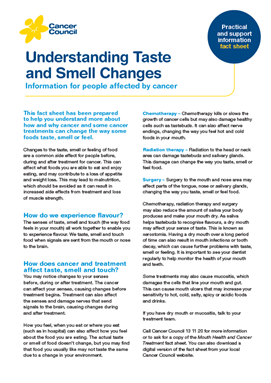- Home
- Cancer Information
- Living well
- Nutrition and cancer
- Treatment side effects and nutrition
- Nausea and vomiting
Nausea and vomiting
Nausea is feeling sick and vomiting is throwing up. It’s common to have them together.
Learn more about:
Overview
Radiation therapy, chemotherapy, other medicines and the cancer itself can cause nausea and vomiting. If you have chemotherapy, you will be given anti-nausea medicine with your treatment and to take at home afterwards. In many cases, this will prevent severe nausea and vomiting, but some people do still feel sick and may vomit. It’s important to take anti-nausea medicine as directed to help prevent nausea from occurring – don’t wait until you feel sick.
Nausea and vomiting can also be triggered by stress, food smells, gas in the stomach or bowel, motion sickness or even the thought of having treatment. After a person has had a few treatment sessions, they may link certain sights, sounds or smells with treatment and feel nauseated when they experience them. This is known as anticipatory nausea or vomiting, and it is more common in people having chemotherapy.
Coping with nausea
- Have a light snack before chemotherapy, and don’t eat for a few hours after.
- Eat small meals every 2–3 hours. Going without food for long periods can make nausea worse.
- Choose dry or bland snacks, e.g. crackers, toast, dry cereals, bread sticks or pretzels.
- Have cold foods or foods at room temperature as they have less aroma.
- Drink fluids all day to avoid becoming dehydrated.
- Try drinks and foods with ginger, e.g. ginger tea, non-alcoholic ginger beer, ginger biscuits.
- Avoid foods that are too sweet, fatty, fried or spicy, or that have strong smells.
- Brush teeth regularly to help reduce tastes that may make you feel nauseated.
- Don’t eat your favourite food when feeling nauseated as you may develop a permanent dislike.
Coping with vomiting
- Take sips of fluids as often as possible, e.g. flat dry ginger ale, cold flat lemonade, weak cordial, or cold apple juice. Oral rehydration solutions, such as Hydralyte or Gastrolyte, can help keep you hydrated.
- See your doctor if vomiting lasts for more than a day or if you can’t keep fluids down, as you may become dehydrated.
- Slowly introduce more nourishing fluids once you stop vomiting, e.g. cold or iced drinks; milk or fruit drinks with added water so they are not too strong; clear broth; weak tea.
- Have small amounts of solid foods once vomiting is under control, e.g. plain dry biscuits; toast or bread; stewed fruits and yoghurt.
- Increase how much you eat until you’re eating what is normal for you.
- Listen to our podcast episode on appetite loss and nausea below.
→ READ MORE: Managing mouth sores
Podcast: Appetite Loss and Nausea
Listen to more episodes from our podcast for people affected by cancer
More resources
Jacqueline Baker, Senior Oncology Dietitian, Chris O’Brien Lifehouse, NSW; Lauren Atkins, Advanced Accredited Practising Dietitian, OnCore Nutrition, VIC; Dr Tsien Fua, Head and Neck Radiation Oncology Specialist, Peter MacCallum Cancer Centre, VIC; Rosemerry Hodgkin, 13 11 20 Consultant, Cancer Council WA; Clare Hughes, Manager, Nutrition Unit, Cancer Council NSW; John Spurr, Consumer; Emma Vale, Senior Dietitian, GenesisCare, SA; David Wood, Consumer.
View the Cancer Council NSW editorial policy.
View all publications or call 13 11 20 for free printed copies.
Need to talk?
Support services
Exercise and cancer
Exercise has many benefits both during and after cancer treatment, helping with side effects, speeding up recovery, and improving quality of life
Looking for transport, accommodation or home help?
Practical advice and support during and after treatment
Cancer information
Relaxation and meditation
Learn how relaxation and meditation can help you both during and after cancer treatment, or listen to our relaxation and meditation podcast
Cancer treatment
Learn about the different treatments that are used to treat cancer, such as surgery, chemotherapy, radiation therapy and targeted therapy

